| « Hot Doug...ON TRIAL! | Thursday Quick Links » |
Feature Thu Mar 29 2007
Jiro and Akemi
I had the good fortune to work at "Izakaya Hiwatta" in Ichinomiya, Japan. That would be a traditional eating and drinking establishment, similar to what we would call a pub.
It was owned by Jiro and Akemi Iwata, old friends of mine.
Many years ago, shortly after they'd arrived in America, I had taken them under my wing. They worked at my local sushi bar in Chicago. He as a sushi chef, and she as a waitron unit. As our friendship developed and we began to know each other, I basically taught America 101 to my willing students. They returned the favor tenfold. Early on JIro told me in fairly broken English the reason for our friendship was that "many people hear me, but very few listen."
I evidently had a golden ear.
Chicago. 1980-86. Trips to the deli to lecture them on which meats may never touch mayonnaise. My new friends truly were aliens and I was trying to prevent a sacrilege upon corned beef or pastrami. How to not wait in line at hip nightclubs, and once in, how to not buy drinks. How to buy a car... a Toyota Camry, but of course. And insurance. Cool music or neighborhoods or stores to check out. What Doctors or Vets or shoe repair to use. Assorted happenings about town. Whatever.
Summer BBQ at the beach segued into trying to keep warm while tobogganing, with "Bullshots" (warm beef bullion and vodka) drunk from flasks we had in our coat pockets.
Everything and/or anything.
It was a symbiotic relationship though. I received so much in exchange. Sumo wrestling. Judi, the Japanese David Bowie. The outrageous television game shows that their friends back home would send them on this new medium called "video." Akemi playing "dress up" with my girlfriend du jour doing the full geisha.
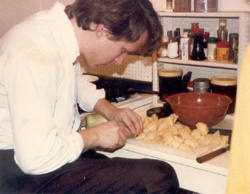 Jiro and I would carve fresh bamboo shoots into the shapes of cranes and turtles, symbols of long life, until dawn on New Years Eve every year. Our own tradition. I'd never even seen a bamboo shoot that hadn't come pre-sliced out of a can before then.
Jiro and I would carve fresh bamboo shoots into the shapes of cranes and turtles, symbols of long life, until dawn on New Years Eve every year. Our own tradition. I'd never even seen a bamboo shoot that hadn't come pre-sliced out of a can before then.
Once Jiro got me this surreal music gig upstairs of Hapi Sushi where they worked. I worked weekends playing drums in a private Japanese hostess bar with a Japanese trio. Two years as a human karaoke machine accompanying very drunk Japanese businessmen, playing assorted Japanese and American pop tunes, mixed with the occasional Samurai war song.
To be sung: "Fee-rings, nothing more than fee-rings."
Or I'd hear, "It's a raltz, Alan-san, a raltz."
The after-gig 3am. employee meals downstairs in the sushi bar were legendary. Talk about raiding the refrigerator. Grilled fresh ika (squid) tossed in soy butter or fire roasted hamachi (yellowtail) collar with yuzu koshu (a kind of Japanese citrus pepper) or zaru soba (cold buckwheat noodles) with grated diakon and fresh wasabi in ponzu or whatever we wanted as long as we stayed.
Le Grande Bouffe ala Japonaise.
But most of all, it was about our friendship. I left Chicago in '86 and they long ago moved back to Japan. An occasional call and we'd exchange cards at New Years. I hadn't seen them in 15 years and now we'd be together again.
Old traditions die hard.
They had an 11-year-old daughter I'd never met. To assure her instant love, which I was prepared to buy, I went to that bastion of Americana, the great suburban shopping mall in the "mouth of the rat," or Boca Raton as it is also known, in search of a candy store. What better gift could there be than a couple bags of candy you've never tasted, when you're 11 years old? For 20 bucks, I'd be a hero. Make a right turn at Caramel Bulls Eye Boulevard and a left at Little Candy Buttons on Paper Drive. Do not though, pass the Schakolad Highway.
It worked. Na Na Na loved it.
When she was born, the fortuneteller had told them they needed three syllables in her name... and since Jiro liked to sport an occasional pompadour (which he was known to dye blond on occasion) and loved rockabilly... Jiro and Akemi begat Na Na Na, and all was cool, daddy.
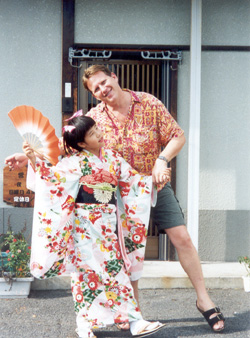 I became her pet gaijin or "foreign devil." She never left my side. She hung on me, off me, around me, everywhere we'd go. Like a little monkey on my back, and I loved it. At the all night noodle stand, the bowling alley, school dances, shrines, everywhere.
I became her pet gaijin or "foreign devil." She never left my side. She hung on me, off me, around me, everywhere we'd go. Like a little monkey on my back, and I loved it. At the all night noodle stand, the bowling alley, school dances, shrines, everywhere.
For an outsider or "gaijin" the Japanese culture is fascinating to behold. Ancient customs morph into today's world seamlessly and coexist side-by-side, transporting the "then" to the "now." Sumo wrestlers taking the train. An abacus lying next to a computer. Kabuki Theater with the music from the Dick Van Dyke Show or equally Felliniesque, a Samurai movie with the theme from Bonanza playing behind it.
"Look out Little Joe-san!"
The music from old '60s American television shows coupled with an ancient art form makes, at least for this cowboy, strange bedfellows. Very weird indeed.
Porky Pig in Japanese is truly something to behold.
Contrasts abound. I suppose the same could be said of the U.S. but I'm used to them here. Japan has a refined sophisticated culture that's obsessed with the childish the cute and the bizarre. They have no army but they love uniforms, and have them for all occasions. Railroad station floor sweeper, parking lot attendants, department store sales clerks, school children. The list goes on and on.
There's an enormous selection in the Japanese diet besides sushi, and Izakaya Hiwatta served it all. They had a live tank for certain items and Jiro would just fish out whatever it was with a net, guaranteeing optimum freshness.
Early morning jaunts to the enormous yet spotless wholesale fish market were standard procedure. The market covered acres. Fork lifts driven by short stocky men with jet-black hair, light blue shirts and white rubber boots.
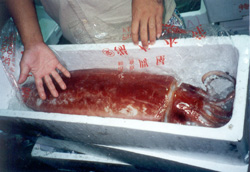 On display were an astonishing assortment of the most pristine and sometimes, unrecognizable sea monsters I had never remotely imagined.
On display were an astonishing assortment of the most pristine and sometimes, unrecognizable sea monsters I had never remotely imagined.
Five-foot-long double-handled, razor sharp knives — one handle on each end of the blade, slipped under the fish carcass' held aloft by motorized chain belts with hooks dangling down, like a G M assembly line. Two men, alternating strokes on either side of Charlie the tuna, like cutting down a tree.
The eels on the other hand, which are most "oishi," or "delicious," are impaled on a nail just under the head and skinned by slipping a kind of large wire-stripper like device around their circumference just below said nail, or where their neck would be if they had one, and then pulling straight down, from head to tail. That tended to stop their squirming fairly quickly.
But I digress. Enough with the stories. Here's the good part, at least regarding the theme of this adventure. The point is, Izakaya Hiwatta, aka Jiro and Akemi, mainly served traditional Japanese pub fare.
Call it bar food, pub grub, Cuisine du Mere, or whatever you like.
I was the willing recipient of the most amazing of delicacies: Fresh sea urchin (from the live tank) wrapped in shiso leaves with Iranian caviar. Fried gingko nuts. Unfiltered sake from Hokkaido in the north, near Russia. Oysters the size of both your fists (also from the live tank). He'd usually quarter them but I insisted on eating them whole while they were still kicking. Mochi, or glutinous rice, shaped around a stick like a popsicle, slathered with miso paste and then grilled.
Yes!
Then there was ayu, one of my favorites. A small freshwater fish similar to perch that has entire restaurants devoted to it alone, served 20 different ways. The restaurants were often nestled on the banks of a river.
You'd order it and then grill it over a brazier at the table, which is the preferred method. Hold the head between your thumb and index finger, gently twist and pull, and the head is removed with the skeleton intact. You've just filleted your first ayu of many to follow. Or you could have it steeped in sake, or as nabe (stew) cooked over the brazier, or as a rice dish, or as sushi.
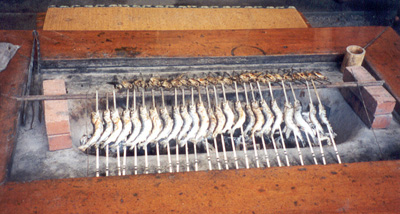
When the season ended, the restaurants would close.
This is Japanese soul food that most gaijin just do not ever get a chance to sample.
Additionally, I was staying in their home, living like family, which is absolutely unheard of there. You can know someone 10 years and never have been to his or her home. The home is considered their private sanctum and refuge. A place to leave the chaos of the outside world behind. It starts at the door, which is why you immediately take off your shoes upon entering a Japanese home — so as not to bring the outside world in.
Different rules apply here. While the outside world is most definitely controlled by the men, the flip side is that the home is most definitely controlled by the women. "Mr. Salaryman," who may be a big-shot executive at work, is but a little boy at home.
As few enter the home besides family, luckily for me, Jiro and Akemi had been thoroughly Americanized, so staying on a futon in their living room was not an issue. Blending into their family unit wasn't either.
And Alan makes five.
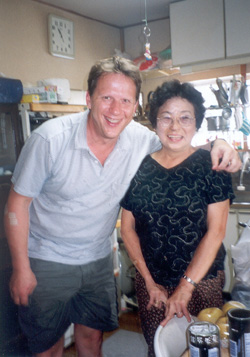 I even inherited "Oba-chan," which means Grandmother. Akemi's mother. As is the custom there, multi generations live under the same roof. Unlike here in the States, the older generation is venerated, and are not farmed out to nursing homes or forgotten. They are respected and sought for their wisdom. They are "sensei" or teachers. Helpers and role models to the family. Gray panthers.
I even inherited "Oba-chan," which means Grandmother. Akemi's mother. As is the custom there, multi generations live under the same roof. Unlike here in the States, the older generation is venerated, and are not farmed out to nursing homes or forgotten. They are respected and sought for their wisdom. They are "sensei" or teachers. Helpers and role models to the family. Gray panthers.
Oba-chan once took me to her tai chi class. Just me and the girls. Thirty or so shockingly lithe seniors and not one could speak a word of English. As I tried to follow along, they left me in the dust.
Once while petting a wild doe in a park I slipped and skinned my knee and tore my pants. When I got home, she pantomimed to take off my torn pants while drawing me a bath and later cleaned my boo boo, accompanied by cooings and murmurings that anyone could understand in any language. She later took it upon herself to go through all my clothes and mend whatever she saw needed her attention. As a single man, that was quite a bit. I brought her some beautiful orchids to thank her and spied a tear in her eye.
A charter member of the international sisterhood of bubbes, no doubt.
She'd also let me use her bike. Problem was that she wass about 4'10" and I'm 6'. I looked like a clown in the circus riding a tricycle. When I pedaled, my knees would come up to my chest. I'd be on my way to my daily bathhouse fix and people would be honking their horns and waving at my absurd spectacle.
The neighbors were talking.
And we gave them plenty to talk about. One night I cooked my food at the restaurant for Jiro and Akemi's special guests. Only their best customers were invited to Alan-san's 11-course Kiyoseki dinner. Jiro and I shopped and prepped for two days while Akemi, ever the artist totally transformed the restaurant by completely redecorating it for the evening.
It was a blowout affair and I was told "quiteta oishi, Alan-san."
Two seatings of 30 each, eating my Seared Diver Scallops with Braised Oxtails, Shiitake and Mitake Mushrooms and Roasted Shallot Ragout served over Truffled Mashed Potatoes. That's the only dish I can remember from that night, only because the oxtails, which in the US cost about $3 a pound, cost nearly 15 times that in Japan. Not quite as much as the truffles, which I used liberally, but you get the idea.
The rest was a blur.
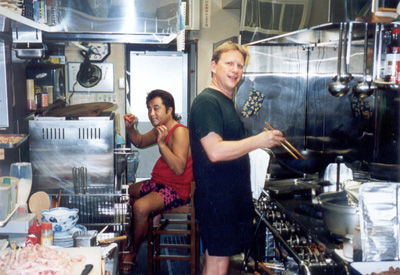
No more than as Americans do we eat mainly "hamabuggas" (which a few present were a bit disappointed by not getting) do the Japanese eat mainly sushi. Far from it.
Between Oba-chan cooking a daily lunch for us of up to 10 small courses (think Japanese tapas) with different pickled and stewed items with very foreign foods (at least to this "foreign devil") and Izakaya Hiwatta, I literally had hundreds of new food sensations during my stay. Jiro begged me to stay as long as I wanted; he said Oba-chan was pulling out all the stops with her "greatest hits" for me and that he never ate that well when I wasn't there. Her Kakiage remains one of my favorite things I've ever put in my mouth.
Oishi was the word. Sensory overload was the reality.
Whale tastes like bacon. Horse sashimi ala Seabiscuit, I'm sorry to report, is delicious. When in Rome. Or in this case, Japan.
Really the only thing I didn't care for in the three months I was there was the umbilical cord of a baby pig in a spicy gelatinous broth of what appeared to be — and I'm hoping it wasn't — placenta. The translation was rough at best, so I'm not quite sure. Although they knew English perfectly well, Jiro and Akemi would selectively lose their facility in it at their convenience. Texturally, I couldn't get past it. The crunch-air-crunch of the cord. Like hollow spaghetti, or a straw. And then of course, there was the possible involvement of placenta mucus.
Next time, I'll pass.
I sat in at a couple jazz clubs and in so doing, got asked to play some gigs in Tokyo and Kyoto. I rode the Shinkansen or bullet train at nearly 190 miles an hour through phenomenal landscapes of rice paddies and rivers past Mt. Fuji. I sought out a revered old blind acupuncturist but found more relief from an outrageous Japanese take-a-left-turn-at-voodoo medical procedure. Or a one night affair that was consummated in a phone booth and neither of us spoke the other's language. I saw the amazing Zen rock gardens at the ancient temple in Kyoto that Akemi took me to and went to a Shogun's palace where the wooden floor had a built-in squeak so no one could approach without being heard, hence a ninja's need for silence. I watched and learned the way food was presented on a plate and honored as a spirit. The trip changed me as only travel can.
I've learned more on the road than I ever did in a school.
Lastly, I'm proud to say, I managed to remain in the no karaoke zone. I believe I may be the only gaijin to have escaped singing "My Way" or anything by Elvis Presley during my stay. I'm not sure; I'll have to check the record books. If so, it's quite a feat.
Whenever I tried to thank them for their amazing hospitality and generosity, Akemi would just smile and say, "But Alan-san, you gave us America."
Alan Lake has been a professional chef for 25 years and has won numerous awards, professional competitions and distinctions. He's mainly consulting now, setting up projects like kitchen design, menu development, hiring and training staff, research, etc. He has also been a professional musician most of his life, coining the term "jazzfood" to describe "solid technique based upon tasteful improvisational skills." Just like the music.









Paul Villanueva / June 15, 2007 11:22 PM
Hi i'm looking for my japanese friend her name is akemi iwata! I'm her friend back in the philippines and we lost contact since she left! I wonder if you could help me get in touch with her! thank you!